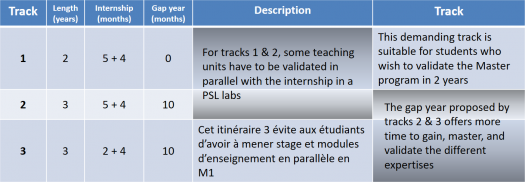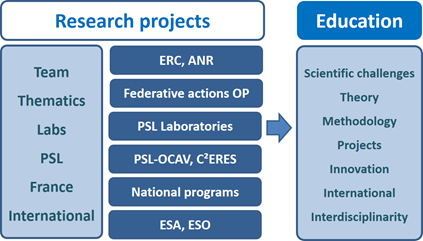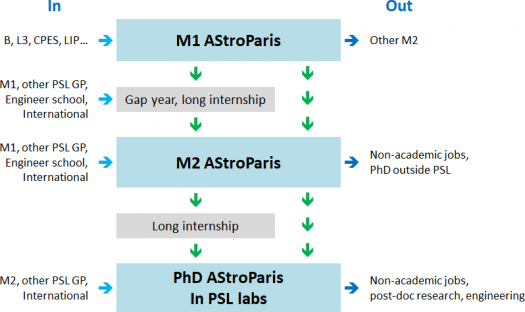Majors
The graduate program is a competitive program that offers different courses, with a high level of flexibility, based on a research and education project. It proposes a training reinforced by stronger connection with research, starting from the Master’s degree, as close as possible to the competitive projects of astrophysical research. Therefore, the graduate program presents the training from a different angle, by a choice of majors that explain the training in terms of educational itinerary at the Master level.
Majors for the Master level :
- Instrumental astrophysics
- Observational astrophysics
- Numerical astrophysics
- Theoretical astrophysics
- Digital engineering
- Instrumental engineering
On purpose, each of these majors is characterized by methodological skills. This represents the specific signature of the graduate program AStroParis, in order to deliver the most efficient education in terms of employability. In practice, these methodological skills will be driven by astrophysical subjects. Doing so, AStroParis mimics efficiently the classical scientific approach : answering key scientific questions requires a dedicated methodology based on efficient skills.
Minors correspond to the usual themes of astrophysics
A few examples illustrate this approach, which can be used to help the application process, and demonstrates that different methodological skills are associated with different themes. In practice, the admission process and follow-up of students at AStroParis is intended to transform the objectives of the students in a constructed experience.
Camille dreams of exoplanets and wishes to work on this subject. After reading the webpage of AStroParis, Camille identifies that her major interest relies in the detection (characterization) [physics] of exoplanets. Interaction with an expert helps defining the majors to be chosen : instrumental astrophysics and observational astrophysics (observational astrophysics and mathematical physics) [numerical astrophysics and mathematical physics].
Dominique has identified that many outstanding programs are foreseen in cosmology ; he finds this field fascinating but has no concrete idea. As Dominique has (does not have) a strong background in physics, an efficient cursus at AStroParis consists in choosing numerical astrophysics and mathematical physics (observational astrophysics and numerical astrophysics) as majors.
Claude is keen of HPC and wishes to use HPC methods in astrophysics. Different projects and lectures can be selected. A major in numerical astrophysics hast to be of course selected. It appears that a lecture in stellar physics will provide a very good driver to fulfill Claude’s project.
These examples illustrate that Majors are selected according the research and education project designed by each student of the graduate program and validated by the pedagogical team.
Different tracks
The graduate program proposes three different tracks at the Master level.
Classical lectures / training
Tracks 1 and 2 of the graduate program propose a larger amount of time in the labs than the other way. The presence in the laboratory allows the acquisition of credits, with an equivalence of 5 ECTS per effective month of internship. The notion of effective months takes into account the possibility for students to devote 3 half-days per week to lectures, in parallel with their internship. Students on these tracks also have to follow teaching units in flipped pedagogy (+lien vers l’explication du terme, cf page Applications).
This flexibility aims to facilitate the follow-up of modules in other graduate programs, for an interdisciplinary opening. It also allows the most talented students to earn more than 60 ECTS per year, and thus to appear in optimal position for their PhD track.
Differences between the Master program and the graduate program
The four current courses of the Master SUTS are defined by a common core in M1, with options, and four themes in M2 (presented in Table 1) : astrophysics ; dynamics of gravitational systems ; planetology ; tools and systems of astronomy and space system engineering. These different courses remain for the classical course of the Master, but AStroParis presents the training from a different angle, by a choice of majors.
Only students expressing a training project in connection with the research & education line will be qualified for the graduate program


A la carte training
Each student applying to the graduate program AStroParis is required to present a research and education project. The consistency of this project is estimated. If needed, modulations are proposed by the pedagogical team of the graduate program. The choice of the majors is fine-tuned during the cursus.
According to the background of the students and to theirs projects, adjustments are possible for an "à la carte" program.
Graduate program and PhD tracks
Entering the graduate at any step is possible (+ lien vers la figure in-out de la page Application & Grants) with entry at any level of the Master, depending on each individual situation (international cursus, interdisciplinarity, specialization…). What matters is the research and education program.
AStroParis also offers to its most ambitious students the possibility to build a PhD track from the M1 level to the completion of a PhD. The PhD track is decided according to a selection at the entrance of the program, based on a research training project. The project can be modulated along the cursus.
With such PhD tracks, AStroParis remains competitive and selective at all stages.

